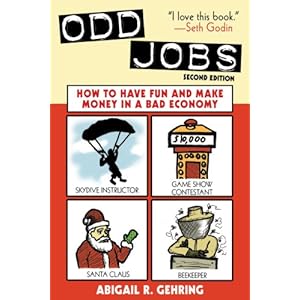10 Great Books About Underground Economy, Working Under The Table And Surviving When Economy Sucks
1. Off the Books: The Underground Economy of the Urban Poor
In this revealing study of a Southside Chicago neighborhood, sociologist Venkatesh opens a window on how the poor live. Focusing on domestics, entrepreneurs, hustlers, preachers and gangs linked in an underground economy that “manages to touch all households,” the book reveals how residents struggle between “their desires to live a just life and their needs to make ends meet as best they can.” In this milieu, African-American mechanics, painters, hairdressers, musicians and informal security guards are linked to prostitutes, drug dealers, gun dealers and car thieves in illegal enterprises that even police and politicians are involved in, though not all are criminals in the usual sense. Storefront clergy, often dependent “on the underground for their own livelihood,” serve as mediators and brokers between individuals and gang members, who have “insinuated themselves—and their drug money—into the deepest reaches of the community.” Although the book’s academic tenor is occasionally wearying, Venkatesh keeps his work vital and poignant by using the words of his subjects, who are as dependent on this intricate web as they are fearful of its dangers.
2. Freakonomics: A Rogue Economist Explores the Hidden Side of Everything
Economics is not widely considered to be one of the sexier sciences. The annual Nobel Prize winner in that field never receives as much publicity as his or her compatriots in peace, literature, or physics. But if such slights are based on the notion that economics is dull, or that economists are concerned only with finance itself, Steven D. Levitt will change some minds. In Freakonomics (written with Stephen J. Dubner), Levitt argues that many apparent mysteries of everyday life don’t need to be so mysterious: they could be illuminated and made even more fascinating by asking the right questions and drawing connections. For example, Levitt traces the drop in violent crime rates to a drop in violent criminals and, digging further, to the Roe v. Wade decision that preempted the existence of some people who would be born to poverty and hardship. Elsewhere, by analyzing data gathered from inner-city Chicago drug-dealing gangs, Levitt outlines a corporate structure much like McDonald’s, where the top bosses make great money while scores of underlings make something below minimum wage. And in a section that may alarm or relieve worried parents, Levitt argues that parenting methods don’t really matter much and that a backyard swimming pool is much more dangerous than a gun. These enlightening chapters are separated by effusive passages from Dubner’s 2003 profile of Levitt in The New York Times Magazine, which led to the book being written. In a book filled with bold logic, such back-patting veers Freakonomics, however briefly, away from what Levitt actually has to say. Although maybe there’s a good economic reason for that too, and we’re just not getting it yet.
3. Ragnar’s Guide to the Underground Economy
Through detailed case studies Ragnar shows you how carpenters, woodcutters, farmers, housecleaners, computer consultants, mechanics, lawyers, vendors, locksmiths and others are cashing in on today’s booming economy - and keeping what they earn by not paying taxes. From these undergrounders you’ll learn how to locate work, get paid without supplying identifying numbers, prepare a realistic budget, advertise your services or product and finance your project when you can’t go to the bank. You’ll also learn the pitfalls of working off the books and what you can do to prepare for them.
4. How to Survive Without a Salary: Learning How to Live the Conserver Lifestyle
I thought that this book was so funny in places that I haven’t laughed so hard, so much, for a long time. Charles is a skilled writer; the book is very readable, intelligent, thoughtful,and well organized. It contains a copious (even prodigious) amount of tips, for a 200-page book. Very practical, and at the same time touches on abtruse philosophical areas, especially at the end of the book.
Hey, I used to think I was cheap. This guy is CHEAP. His anecdotes include waiting for it to rain to take a shower instead of installing indoor plumbing. He had a big hole in the floor of his entryway, or somewhere in his house, into which the kids and a few guests fell. He refused to spend one cent covering the hole, until a neighbor told him about a steel grate they threw away years ago, so he went to the dump and found it.
The point is that you can learn from a top-notch “conserver”; an applied example I would give is to buy two gallons of milk when it’s on sale and freeze one for later use (works well!). This guy probably drinks powdered milk though.
I disagree with his economic analysis; prudence CAN be a vice, as any virtue most certainly is in its extreme, or even overdone. But Adam Smith’s Wealth of Nations is not just about “McPimple Burger” or keeping up with the Joneses. Any system on a mass scale is going to have gaping faults, and the weaker of us might succumb to our basest impulses. But perhaps Long goes a bit too far the other way…
At any rate, he sounds like an economic anarchist. Very well thought out book, great advice.
5. Gang Leader for a Day: A Rogue Sociologist Takes to the Streets
In Freakonomics, many people were fascinated by a section that described how most crack cocaine dealers lived at home with their mothers. Why? They make less money than minimum wage. The source of that factoid was research conducted on site by Sudhir Venkatesh, author of Gang Leader for a Day, who describes in this book how he did that research and came to make decisions one day for part of the Black Kings gang in Chicago.
In the process of reading this book, you’ll learn more than you ever expected to know about the ways that the poorest people support and protect themselves. You’ll also find how drug-dealing gangs are both a help and a hindrance to the poor.
More powerfully, you’ll be exposed to the great difficulties involved in observing the lives of the poor and the gangs that spring from them. The moral and ethical dilemmas this book presents are almost beyond belief.
6. Under the Table and Into Your Pocket: The How and Why of the Underground Economy
Under The Table And Into Your Pocket: The How And Why Of The Underground Economy by Bill Wilson will provide the non-specialist general reader with a complete education on a facet of the American economy rarely (if ever) covered in school. Beginning with an introduction to just some of the ways governmental regulations strangle business, overtax the little guy, and enable Washington to be the drunken big spender that it is today (if you overpay your taxes by $7,000 and don’t reclaim it within three years you’re out of luck - but underpay it by $7,000 and the IRS can and will come after you no matter how much time has passed!), Under The Table proceeds to demonstrate how the little guy can circumvent taxes by doing business away from Big Brother’s prying eyes. From boarding houses and flea markets to roadside merchants and dominatrix work, Under The Table covers the benefits, disadvantages, tips, tricks, techniques and much more of common underground ways to earn a living. Under The Table is emphatically not a legal guide; neither the author nor the publisher assume any responsibility for the use or misuse of information contained within - but the eye-opening ins and outs of a truly free economy make for quite fascinating and advantageous reading.
Are you fed up with giving so much of your hard earned cash to the government, then watching it get spent on ridiculous pork-barrel special-interest projects? Would you like to hold on to more of your money for your own special-interest boondoggles? The underground economy continues to grow in spite of ever-widening atttempts by the government to regulate and tax everything we do. Millions of Americans are practising fee enterprise in today’s increasingly unfree tax society. This is the most comprehensive how-to book ever written for those entrepreneurial individuals who have decided to end their slavery to a wage and to government taxation as well. Discover how you can keep more of what you earn for yourself. Here you will find complete and up-to-date information on the ins and outs of guerrilla capitalism and the underground economy in this country.
In December of 2001 Jeff Ferrell quit his job as tenured professor, moved back to his hometown of Fort Worth, Texas, and, with a place to live but no real income, began an eight-month odyssey of essentially living off of the street. Empire of Scrounge tells the story of this unusual journey into the often illicit worlds of scrounging, recycling, and second-hand living. Existing as a dumpster diver and trash picker, Ferrell adopted a way of life that was both field research and free-form survival. Riding around on his scrounged BMX bicycle, Ferrell investigated the million-dollar mansions, working-class neighborhoods, middle class suburbs, industrial and commercial strips, and the large downtown area, where he found countless discarded treasures, from unopened presents and new clothes to scrap metal and even food.
9. McMafia: A Journey Through the Global Criminal Underworld
In McMafia, Misha Glenny draws the dark map that lies on the other side of Tom Friedman’s bright flat world. That connected globe not only brings software coders and supply-chain outsourcers closer together; it’s also opened the gates to a criminal network of unsettling vastness, complexity, and efficiency that represents a fifth of the earth’s economy, trading in everything from untaxed cigarettes and the usual narcotics to human lives and nuclear material. Glenny’s a Balkans expert, and he begins his story there, with the illicit–but often state-sponsored–underworld that grew out of the post-Soviet chaos, but he soon follows the contraband everywhere from Mumbai and Johannesburg to rural Colombia and the U.S. suburbs. It’s not just a hodgepodge of scare clips, though: Glenny reports from the ground but follows the leads as high as they go, showing how the dark and bright sides of the flat world are more connected than we imagine.
10. Living Well on Practically Nothing
Living Well on Practically Nothing: Revised and Updated Edition is for people who need to live on a lot less money. If you have been fired, demoted, retired, divorced, widowed, bankrupted or swindled - or you just want to quit your job and remain financially self-reliant - this book is for you. In it are hundreds of tips, secrets and necessary skills for living well on little money. Chapters include: Save Up to $37,000 a Year and Live on $12,000 a Year; Low-Cost Computers for Fun, Profit, and Education; Some Ways to Live on No Money at All; A Day of Cheap Living; A New Career or Business for You; Fix Things and Make Them Last; and Protect Your Investments and Make Them Grow. From cover to cover, this book is stocked with proven methods for saving money on shelter, food, clothing, transportation, entertainment, health care and more. The author left the “system” in 1969 and has worked for himself ever since. Let him show you how you, too, can live happily, comfortably and with complete financial freedom.


